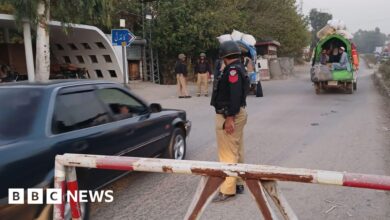Fooled by fake Chinese police
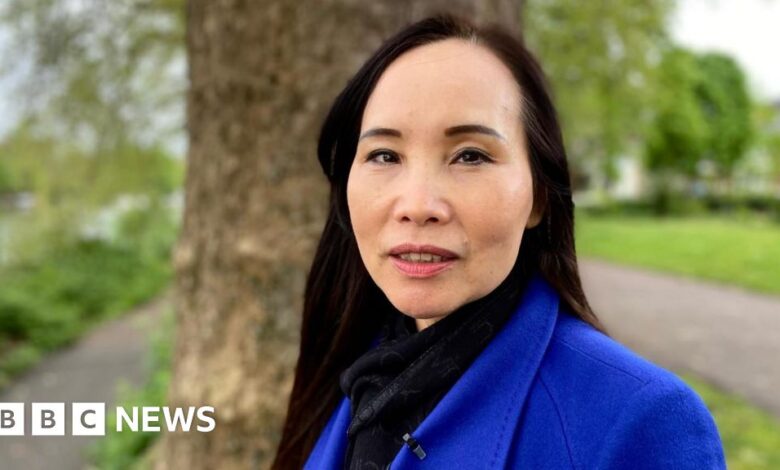
Via Elaine Chong and Ed Main, BBC Trends
 BBC
BBCChinese people around the world are being targeted by an elaborate scam in which criminals pose as Chinese police officers. A British-Chinese woman has told the BBC she handed over her entire life savings to fraudsters who dressed up in uniform on video calls and took her on a virtual tour of what appeared to be a police station.
Helen Young still has nightmares about the two weeks she was tricked into believing she was on China’s most wanted list.
Fraudsters posing as Chinese police officers have manipulated a London accountant into believing she is being investigated for a major fraud back home.
Helen is presented with a mountain of fabricated evidence that seems to implicate her in a crime she knew nothing about.
When fake police threatened to extradite her to a Chinese prison, Helen sent them her life savings of £29,000 as “bail money” in a desperate bid to stay in the UK.
“I feel a little silly right now,” she said. “But there was no way I knew it wasn’t true. It was so convincing.”
Helen’s story may sound extraordinary but there are many similar cases in the Chinese immigrant community.
Chinese embassies around the world have issued public warnings about police impersonation scams, as has the FBI following several incidents in the United States. An elderly woman in Los Angeles reportedly paid $3 million, believing it would prevent her extradition.

Typically, these scams begin with the victim receiving a relatively innocuous phone call. In Helen’s case, someone claiming to be a Chinese customs official told her they had intercepted an illegal package sent in her name.
Helen did not send anything, and she was told to call the police if she believed someone had stolen her identity. Although she was skeptical, Helen did not hang up.
“Chinese people like me, because we were born and raised in China, we are taught to obey,” she said. “So when the party asks me to do something or my parents ask me to do something, it is very rare for me to say no.”
Helen was transferred to a man who claimed to be a Shenzhen police officer named “Officer Fang”. Helen asked for proof and he suggested they video call. When they connected, Helen saw a man in uniform whose face matched the police ID he had shown.
Officer Fang then used his phone to take her on a tour of a police station that appeared to be functioning normally, with several uniformed officers and a table with a large police logo.
“At that moment, all my doubts disappeared. So I said, ‘I’m sorry, I just need to be careful these days, there’s a lot of crime out there,’” Helen said.
While they were talking, Helen heard a message on the loudspeaker in the back, telling Officer Fang to call about her.
Officer Fang detained her and when he returned, he was no longer interested in the illegal parcel. He said he had been informed that Helen was suspected of being involved in a major financial fraud.
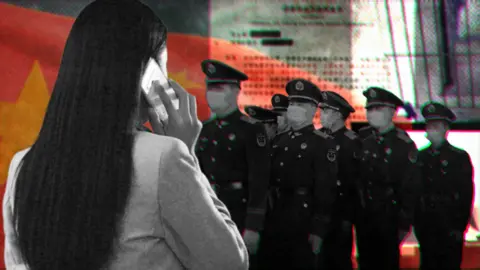
“I said, ‘That doesn’t make sense.’ He said, ‘Nobody said they were guilty. So the evidence is what matters.’”
Helen was shown what appeared to be a bank statement with a huge amount of money in her name. Officer Fang told her that if she was innocent, she would have to help them catch the real criminals. He made her sign a confidentiality agreement, promising not to tell anyone about the investigation. Helen was warned that if she did, she would be sentenced to six more months in prison.
“He said, ‘If you tell anyone that you were questioned by the Chinese police, your life will be in danger.’”
The scammers also asked Helen to download an app so they could eavesdrop on what she did day and night.
Over the next few days, Helen tried to act normally at work. She spent her evenings writing a personal statement she was ordered to write, detailing every aspect of her life.
Then, Officer Fang called back with news that some of the suspects had been arrested. He showed her written statements in which some of them had accused her.
Helen was sent a video in which a male prisoner confessed to police and named her as his boss in the scam.
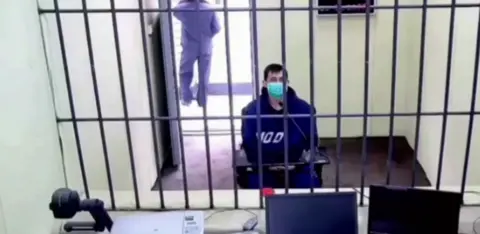
We took a closer look at the video and because the suspect is wearing a large Covid mask, it’s impossible to tell if what you hear matches his lip movements. It would be easy to add a fake soundtrack mentioning Helen’s name or another victim.
But for Helen – who believed she was dealing with real police – the consequences were dire: “After hearing my name like that, I threw up. It made me believe I was in big trouble.”
Helen believed police officer Fang when he told her she would be extradited to China – even though she was a British citizen.
“He said to me, ‘So you have 24 hours, pack your things. The police will come and take you to the airport.’”
Helen was told that her extradition could be stopped if she could raise her bail. After sending her bank statements for verification, she was asked to transfer £29,000.
“I feel terrible because I promised my daughter I would give her money to buy her first apartment,” said Helen.
But a few days later, the fake police returned. Helen was ordered to find another £250,000 or face extradition: “I’m fighting for my life – if I go back to China, I might never come back.”
After Helen tried to borrow money from a friend, he warned her daughter. Helen broke down and revealed everything. But not before putting the phone in a kitchen drawer and taking her daughter into the bedroom, covering her head with a blanket so the scammers couldn’t listen in.
Her daughter listened patiently and explained that it was a scam. Helen’s bank eventually refunded her money, but her anguish could have easily had a more somber ending: “For two weeks, I barely slept. How can you sleep when someone is tracking your phone?”
In her sleep-deprived state, she crashed her car twice. The second time, she completely destroyed it: “I didn’t kill anyone, but I could have. These kinds of criminal scams can kill people.”
Other victims of the police impersonation scam have been taken to even more extreme levels.
In some extreme cases, some Chinese students who could not meet the financial demands of the fake police were convinced to fake their own kidnappings to demand ransom from their families.
Inspector Joe Doueihi of the New South Wales Police Service has led an advocacy campaign to warn about so-called virtual or cyber kidnappings, following a series of cases in Australia.
“Victims were forced to videotape themselves in vulnerable positions, to make it appear they had been kidnapped – tied up with ketchup on their bodies to make it look like they were bleeding and calling for their loved ones,” he said.
 New South Wales Police
New South Wales PoliceThe students were then ordered to self-isolate while the scammers sent the images to their families in China with a ransom demand.
Victims of fraud may also find themselves being manipulated into helping scam others.
“The scammers will trick the victims into believing they are working for the Chinese government. They will send them documents and swear they are Chinese police,” said Det Supt Doueihi.
He said the victim – who may have handed over money to the criminals – was sent to spy on or threaten other Chinese students in Australia.
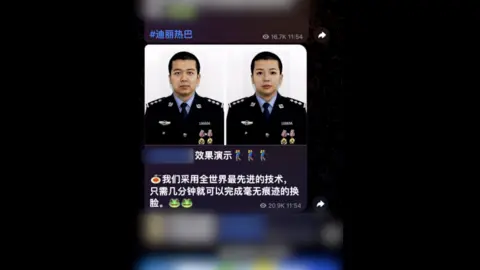
Experts believe many of these scams are run by Chinese organised crime groups operating from compounds in countries such as Myanmar, Cambodia and Laos.
Chinese state media reported that tens of thousands of suspects have been extradited to China over the past year.
Awareness of these types of scams is growing. We spoke to a student in Japan who realized he was being targeted by criminals and recorded their conversations.
He asked not to be named, but shared the recording with the BBC. In it, the scammers told him that if he revealed anything about the call to anyone, he would jeopardise the “investigation”. He refused to hand over any money and they stopped pursuing him.
He knows he was lucky to have escaped: “I never thought it would happen to me. Be very careful when you receive a call from a phone number you don’t know.”





